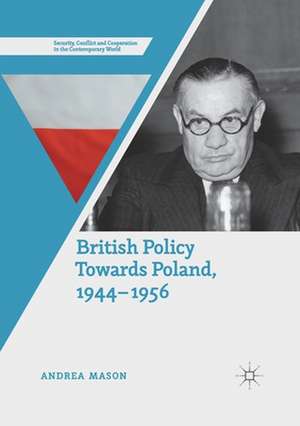British Policy Towards Poland, 1944–1956: Security, Conflict and Cooperation in the Contemporary World
Autor Andrea Masonen Limba Engleză Paperback – 20 feb 2020
| Toate formatele și edițiile | Preț | Express |
|---|---|---|
| Paperback (1) | 383.12 lei 43-57 zile | |
| Springer International Publishing – 20 feb 2020 | 383.12 lei 43-57 zile | |
| Hardback (1) | 500.42 lei 43-57 zile | |
| Springer International Publishing – 29 noi 2018 | 500.42 lei 43-57 zile |
Din seria Security, Conflict and Cooperation in the Contemporary World
- 20%
 Preț: 565.89 lei
Preț: 565.89 lei - 20%
 Preț: 689.79 lei
Preț: 689.79 lei - 20%
 Preț: 629.09 lei
Preț: 629.09 lei -
 Preț: 386.61 lei
Preț: 386.61 lei - 18%
 Preț: 775.15 lei
Preț: 775.15 lei - 18%
 Preț: 785.42 lei
Preț: 785.42 lei - 15%
 Preț: 693.25 lei
Preț: 693.25 lei - 15%
 Preț: 584.43 lei
Preț: 584.43 lei - 15%
 Preț: 527.97 lei
Preț: 527.97 lei - 18%
 Preț: 891.96 lei
Preț: 891.96 lei - 15%
 Preț: 638.25 lei
Preț: 638.25 lei -
 Preț: 384.86 lei
Preț: 384.86 lei -
 Preț: 481.43 lei
Preț: 481.43 lei -
 Preț: 384.09 lei
Preț: 384.09 lei -
 Preț: 391.61 lei
Preț: 391.61 lei - 18%
 Preț: 778.45 lei
Preț: 778.45 lei - 15%
 Preț: 638.76 lei
Preț: 638.76 lei -
 Preț: 390.63 lei
Preț: 390.63 lei - 15%
 Preț: 639.37 lei
Preț: 639.37 lei -
 Preț: 385.84 lei
Preț: 385.84 lei - 15%
 Preț: 471.69 lei
Preț: 471.69 lei -
 Preț: 385.25 lei
Preț: 385.25 lei - 15%
 Preț: 586.55 lei
Preț: 586.55 lei -
 Preț: 383.33 lei
Preț: 383.33 lei - 18%
 Preț: 731.10 lei
Preț: 731.10 lei - 18%
 Preț: 891.80 lei
Preț: 891.80 lei - 15%
 Preț: 699.77 lei
Preț: 699.77 lei - 15%
 Preț: 703.20 lei
Preț: 703.20 lei - 15%
 Preț: 588.18 lei
Preț: 588.18 lei -
 Preț: 386.81 lei
Preț: 386.81 lei - 18%
 Preț: 786.36 lei
Preț: 786.36 lei - 15%
 Preț: 638.57 lei
Preț: 638.57 lei -
 Preț: 380.63 lei
Preț: 380.63 lei -
 Preț: 390.63 lei
Preț: 390.63 lei
Preț: 383.12 lei
Nou
Puncte Express: 575
Preț estimativ în valută:
73.31€ • 76.74$ • 61.02£
73.31€ • 76.74$ • 61.02£
Carte tipărită la comandă
Livrare economică 31 martie-14 aprilie
Preluare comenzi: 021 569.72.76
Specificații
ISBN-13: 9783030404024
ISBN-10: 3030404021
Ilustrații: XIII, 232 p.
Dimensiuni: 148 x 210 mm
Greutate: 0.3 kg
Ediția:1st ed. 2018
Editura: Springer International Publishing
Colecția Palgrave Macmillan
Seria Security, Conflict and Cooperation in the Contemporary World
Locul publicării:Cham, Switzerland
ISBN-10: 3030404021
Ilustrații: XIII, 232 p.
Dimensiuni: 148 x 210 mm
Greutate: 0.3 kg
Ediția:1st ed. 2018
Editura: Springer International Publishing
Colecția Palgrave Macmillan
Seria Security, Conflict and Cooperation in the Contemporary World
Locul publicării:Cham, Switzerland
Cuprins
Chapter 1: Introduction.- Chapter 2: Britain and the Polish Government-in-Exile, January 1944-June 1945.- Chapter 3: From Potsdam to the Moscow Council of Foreign Ministers, July-December 1945.- Chapter 4: The Electoral Bloc to the Polish Referendum, January-June 1946.- Chapter 5: From the Referendum to the Elections, June 1946 - January 1947.- Chapter 6: Mikołajczyk’s Escape, January - November 1947.- Chapter 7: From High Cold War to Early Détente, 1948-1956.- Chapter 8: Conclusion.
Notă biografică
Andrea Mason is a Teaching Fellow in the Department of International History at the London School of Economics and Political Science, UK.
Textul de pe ultima copertă
This book examines the outcome of the British commitment to reconstitute a sovereign Polish state and establish a democratic Polish government after the Second World War. It analyses the wartime origins of Churchill’s commitment to Poland, and assesses the reasons for the collapse of British efforts to support the leader of the Polish opposition, Stanisław Mikołajczyk, in countering the attempt by the Polish communist party to establish one-party rule after the war. This examination of Anglo-Polish relations is set within the broader context of emerging early Cold War tensions. It addresses the shift in British foreign policy after 1945 towards the US, the Soviet Union and Europe, as British leaders and policymakers adjusted both to the new post-war international circumstances, and to the domestic constraints which increasingly limited British policy options. This work analyses the reasons for Ernest Bevin’s decision to disengage from Poland, helping to advance the debate on the larger question of Bevin’s vision of Britain’s place within the newly reconfigured international system. The final chapter surveys British policy towards Poland from the period of Sovietisation in the late 1940s up to the October 1956 revolution, arguing that Poland’s process of liberalisation in the mid-1950s served as the catalyst for limited British reengagement in Eastern Europe.
Caracteristici
Challenges prevailing interpretations of the British approach to the Polish question, arguing that British policymakers continued to feel themselves indebted to the Polish opposition even as their power to influence the shape of post-war Poland diminished Offers the only full analysis of British foreign secretary Ernest Bevin’s policy towards Poland Explores the considerable continuity between the wartime and post-war years, rather than treating the war as a discrete period
